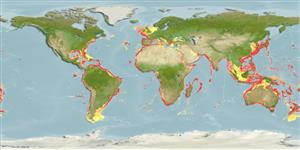Preferred temperature (Ref.
115969): 8.5 - 18.7, mean 12.5 (based on 1162 cells).
Phylogenetic diversity index (Ref.
82804): PD
50 = 1.0781 [Uniqueness, from 0.5 = low to 2.0 = high].
Bayesian length-weight: a=0.00224 (0.00162 - 0.00309), b=3.10 (3.01 - 3.19), in cm Total Length, based on LWR estimates for this species (Ref.
93245).
栄養段階 (Ref.
69278): 4.2 ±0.4 se; based on diet studies.
回復力 (Ref.
120179): 非常に低い, 14年以上の倍増期間の最小個体群 (Fec=9).
Fishing Vulnerability (Ref.
59153): Very high vulnerability (84 of 100).
Climate Vulnerability (Ref.
125649): Moderate vulnerability (43 of 100).
